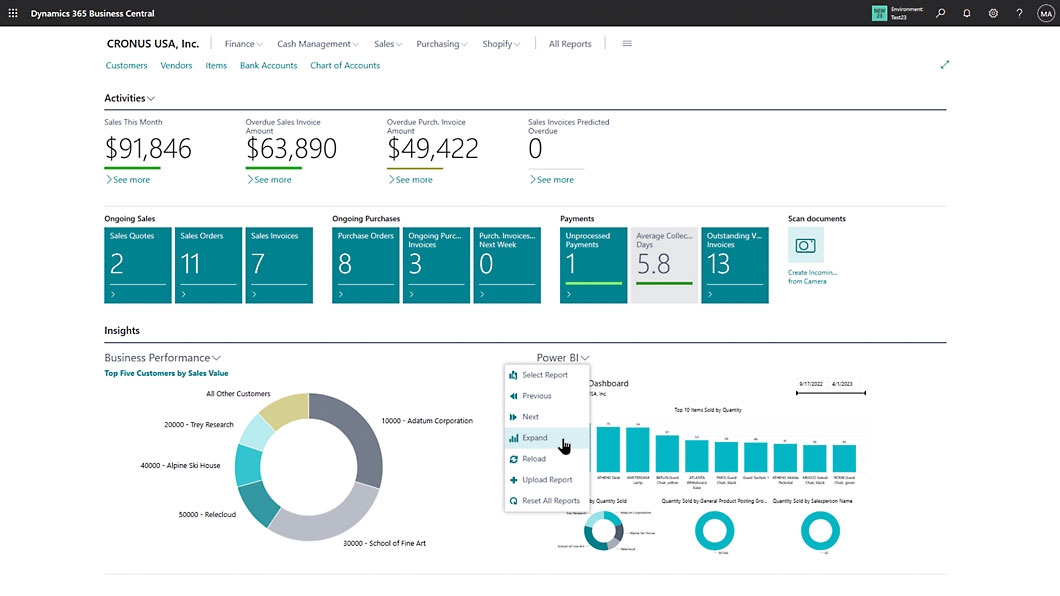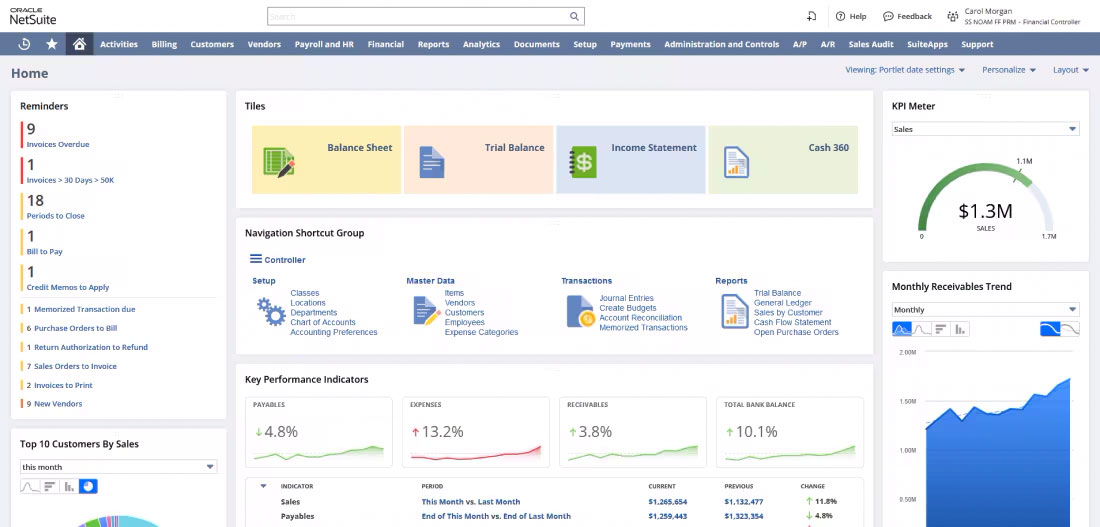Choosing the right ERP
Dynamics 365 Business Central vs. NetSuite
Choosing between Dynamics 365 Business Central and NetSuite is a significant decision that impacts your organization's financial operations for years to come.
Unlike most comparisons you'll find online, our assessment draws from verified data points, including the latest 2025 feature releases, Gartner Magic Quadrant research and performance metrics from over 80,000 combined customers.
A Quick Summary
When comparing Business Central to NetSuite, the biggest differences are cost, implementation time, and built-in functionality. Business Central starts at $70–$100 per user/month with no platform fees, while NetSuite charges $99 per user/month plus a $999 platform fee and extra for modules. It also takes 3–6 months to implement compared to NetSuite’s 6–12 months. Core financial features come included—no surprise charges. And with better Microsoft ecosystem integration and AI tools, total cost of ownership is typically 30–40% lower over three years.


Dynamics 365 Business Central Ideal Customer Checklist:
We created this checklist to help you quickly see if Dynamics 365 Business Central is the right fit for your business. If you're dealing with growing pains, juggling multiple systems, or need more control over your operations and reporting, this list will point you in the right direction.
- Your finance team already works within the Microsoft ecosystem
- You need predictable IT costs without surprise fees or add-ons
- You're on a tight implementation timeline (under 6 months)
- You want to automate repetitive financial tasks to free up your team
- Your budget planning requires complete visibility into all ERP costs upfront
- You need to access your financial data seamlessly from mobile devices, even offline
- You value a personalized implementation approach tailored to your specific processes
- You want to leverage AI to predict cash flow and prevent late payments
Detailed Feature Comparison
NetSuite checks a lot of boxes, but much of its advanced functionality comes with added complexity, higher costs, and longer implementation times. Business Central, on the other hand, delivers what most growing companies actually need—out of the box. From AI-powered forecasting to native Microsoft 365 integration and faster deployments, it’s built to work smarter, not harder. The table below breaks down where the two platforms differ—and why Business Central ends up being the more capable, cost-effective choice for most businesses.
When should you choose NetSuite, and when Dynamics 365 Business Central
Business Central
- When you need predictable budgeting and 30-40% lower TCO, Business Central delivers all-inclusive pricing ($70-100/user/month) with no platform fees or hidden costs – ideal for organizations seeking financial clarity.
- When boosting team productivity matters, Business Central's seamless integration with Microsoft 365, Teams, and Power Platform creates a unified workflow environment your team already knows how to use.
- When time-to-value is critical, Business Central's faster implementation (3-6 months) gets your team productive quickly with less disruption to operations and faster ROI.
- When you need effective multi-company management without complexity, Business Central offers streamlined entity handling that's perfect for growing businesses and domestic operations.
- When leveraging cutting-edge technology matters, Business Central's AI-powered Copilot provides automatic cash flow forecasting, payment predictions, and product descriptions that drive tangible business value.
NetSuite
- Only if you require specialized financial tools and have substantial budget to invest in a premium solution with ongoing module costs.
- Only if you primarily use non-Microsoft products and need specialized third-party integrations.
- Only if you have a flexible timeline and can accommodate a longer 6-12 month implementation with more extensive resource commitment.
- Only if you manage extremely complex global operations with numerous international subsidiaries requiring specialized entity structures.
- Only if basic text enhancement features meet your AI needs and you don't require advanced predictive capabilities.
Comparison Summary
When comparing Dynamics 365 Business Central and NetSuite, financial decision makers should consider their existing technology landscape, complexity of financial operations, and growth trajectory. Business Central offers excellent value for organizations already using Microsoft products, while NetSuite provides robust capabilities for complex multi-entity operations.
The choice ultimately depends on your specific needs, but our analysis shows Business Central provides better value for mid-sized organizations with straightforward financial requirements, while NetSuite excels for enterprises with complex financial structures.
Expert Analysis Provided By:
Barbara Allen
Vice President, Client Solutions
Throughout her career, Barbara has held various key leadership positions as ERP Team Leader, Project Manager, Consultant and Business Systems Implementer. She has successfully implemented ERP systems such as Microsoft Dynamics, Deltek Maconomy and WorkBook in organizations of all sizes; from start-ups companies with 2 users, to Fortune 500 companies with over 1400 users.
Marco D'Ercole
Executive Vice President
For more than 20 years, I have been involved in many complex IT, ERP & CRM and Integration projects for mid-size to enterprise organizations. I have enjoyed working with hundreds of private and public organizations in Canada & USA, across a wide range of industry sectors, to simplify technology and support organizational growth.
Frequently asked questions from businesses deciding between Business Central and NetSuite
We've compiled answers to the most common questions financial decision makers ask when comparing Dynamics 365 Business Central and NetSuite. Our analysis is based on real implementation data, customer feedback, and industry research.



